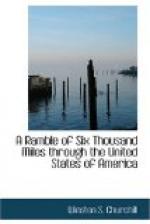Registered Debt, being claims registered prior to the year 1793, for services and supplies during the revolutionary war 27,919 85
Treasury notes 7,116 00
Mississippi stock 4,320 09 ______________ 39,355 94
Making the whole amount of the Public
Debt of the United States 24,322,235
18
______________
Which is, allowing 480 cents to the
sovereign, in sterling money L5,067,132
6_s_. 7_d_.
General Jackson has proposed another source of national revenue, in the establishment of a bank; the profits of which, instead of going into the pockets of stock-holders as at present, should be placed to the credit of the nation. If an establishment of this nature could be formed, without involving higher interests than the mere pecuniary concerns of the country, no doubt it would be most desirable. But how a government bank could be so formed as that it should not throw immense and dangerous influence into the hands of the executive, appears difficult to determine. If it be at all connected with the government, the executive must exercise an extensive authority over its affairs; and in that case, the mercantile portion of the community would lie completely under the surveillance of the president, who might at pleasure exercise this immense patronage to forward private political designs. No doubt there have been abuses to a considerable extent practised by the present bank of the United States in the exercise of its functions; but how those abuses are likely to be remedied by Jackson’s plan, does not appear. For, let the directors be appointed by government, or elected by congress, they must still exercise discretional power; and they are quite as likely to exercise it unwarrantably as those who have a direct interest in the prosperity of the concern. I totally disapprove of the attempt to correct the abuses of one monopoly by the establishment of another in its stead, of a still more dangerous character; and I am inclined to think that if two banks were chartered instead of one, each having ample capital to insure public confidence, competition alone would furnish a sufficient motive to induce them to act with justice and liberality towards the public.
In 1766, Kentucky was first explored, by John Finlay, an Indian trader, Colonel Daniel Boon, and others. They again visited it in 1769, when the whole party, excepting Boon, were slain by the Indians—he escaped, and reached North Carolina, where he then resided. Accompanied by about forty expert hunters, comprised in five families, in the year 1775, he set forward to make a settlement in the country. They erected a fort on the banks of the Kentucky river, and being joined by several other adventurers, they finally succeeded. The Kentuckians tell of many a bloody battle fought by these pioneers, and boast that their country has been gained, every inch, by conquest.




